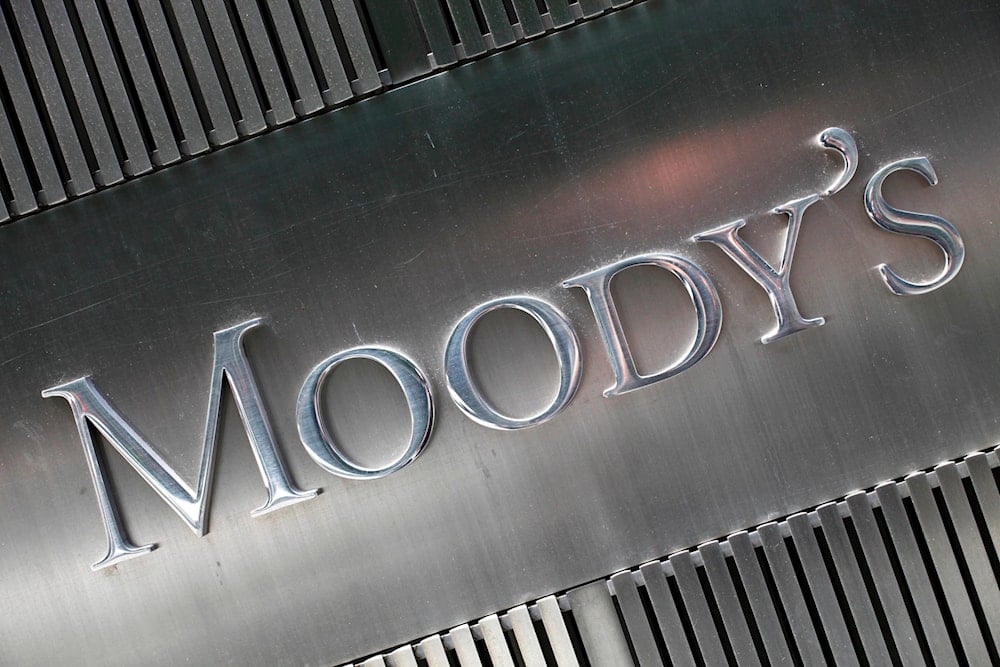‘Very high political risks’ weakened 'Israel’s' economy, Moody's says
Moody’s warns that "Israel's" high political risks have weakened its economic and fiscal strength, citing uncertainty over security, economic growth, and challenges in the high-tech sector.
-

Photo shows a sign for Moody's Corp. in New York, on August 13, 2010. (AP)
Moody’s Investors Service warned of "Israel’s" “very high political risks that have weakened economic and fiscal strength," Israeli media reported.
Moody’s said in a regular update report on the occupation entity’s credit rating that “uncertainty over Israel’s longer-term security and economic growth prospects is much higher than is typical, with risks to the high-tech sector particularly relevant, given its important role as a driver of economic growth and significant contributor to the government’s tax take."
The report noted that these negative developments could significantly impact the government’s finances and lead to further deterioration in institutional quality.
Last year, Moody’s downgraded "Israel's" credit rating by two notches to Baa1, citing the high geopolitical and domestic political risks, and maintained a negative outlook. The agency warned that the entity's "very high political risks" have weakened its economic and fiscal strength.
In its update, Moody’s stated that the negative outlook reflects ongoing "downside risks" to "Israel's" credit rating.
The agency further highlighted challenges such as "very high exposure to geopolitical risks, a polarized political system affecting governance and policy effectiveness, and the labor-market participation of religious minorities, leading to high income inequality and social tensions."
“We may stabilize the outlook if there are clear prospects for a durable cooling down of the military conflicts, in turn allowing Israel’s institutions to formulate policies that support the recovery of the economy and public finances and restore security while dealing with a wide range of policy priorities,” Moody’s maintained.
Israeli economy stalls: 0.7% growth, 3.6% inflation
Last month, The Jerusalem Post reported on February 11 that "Israel's" economy continued to struggle in the second half of 2024, as its war on Gaza deepened financial instability and eroded investor confidence. According to the Bank of Israel's latest financial stability report, macroeconomic risks remain high despite minor improvements in credit and asset pricing.
The central bank's risk assessment, which evaluates the exposure of "Israel's" financial system to macroeconomic challenges, found that economic instability persisted due to the security situation. The report pointed to the war's impact on global perceptions of "Israel's" economy, affecting businesses, government finances, and borrowing costs.
The observations align with projections from the International Monetary Fund (IMF), which recently revised "Israel's" 2024 GDP growth forecast down to 0.7%, citing regional conflicts and heightened uncertainty as major concerns.
Despite a somewhat modest GDP growth following a contraction at the end of 2023, "Israel's" economy has yet to regain its expected trajectory.
"The Composite State of the Economy Index, which indicates the level of economic activity, continued to be sluggish in October and November," the Bank of Israel stated, noting that economic conditions remain difficult.
Meanwhile, the Organisation for Economic Co-operation and Development (OECD) predicts that "Israel's" GDP will grow by 2.4% in 2025 and 4.6% in 2026, largely driven by increased military expenditure and government demand.
The government's increased fundraising efforts and higher bond yields reflected investor concerns. Additionally, Moody's recently downgraded "Israel's" credit rating from A2 to Baa1, warning that the prolonged war could continue to strain the economy.

 3 Min Read
3 Min Read








